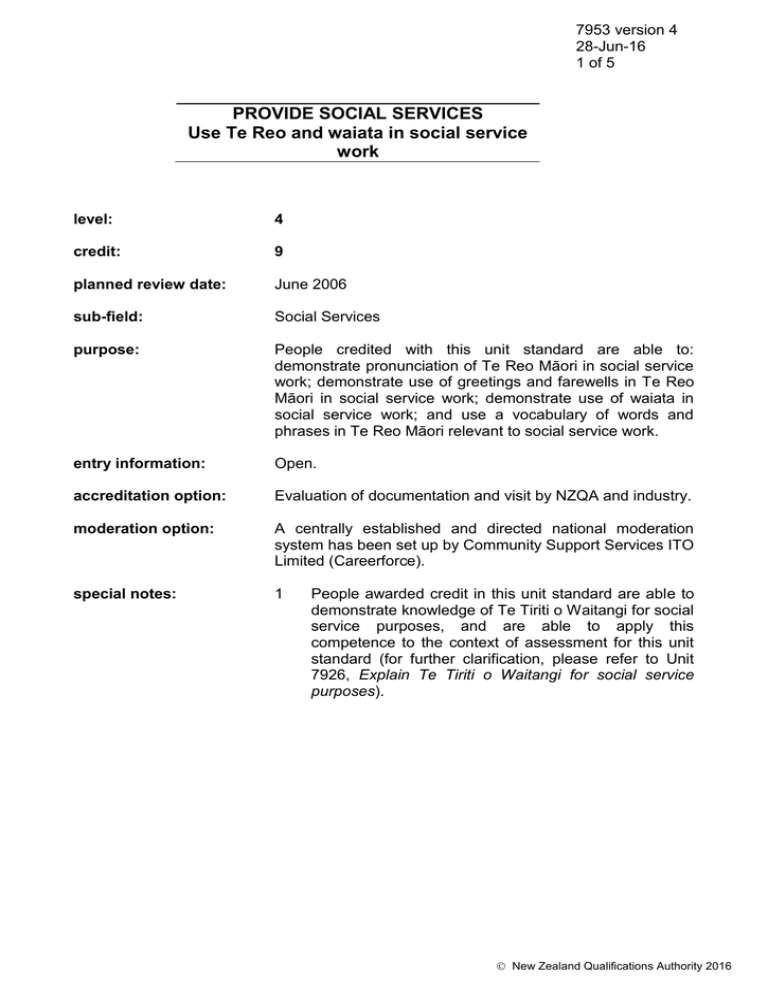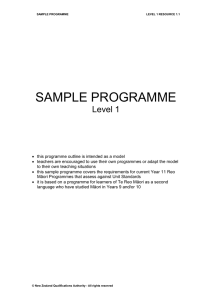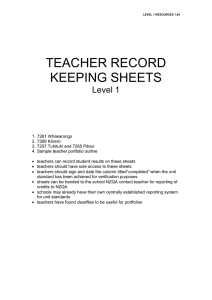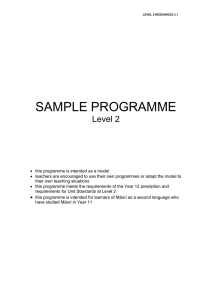PROVIDE SOCIAL SERVICES Use Te Reo and waiata in social service work
advertisement

7953 version 4 28-Jun-16 1 of 5 PROVIDE SOCIAL SERVICES Use Te Reo and waiata in social service work level: 4 credit: 9 planned review date: June 2006 sub-field: Social Services purpose: People credited with this unit standard are able to: demonstrate pronunciation of Te Reo Māori in social service work; demonstrate use of greetings and farewells in Te Reo Māori in social service work; demonstrate use of waiata in social service work; and use a vocabulary of words and phrases in Te Reo Māori relevant to social service work. entry information: Open. accreditation option: Evaluation of documentation and visit by NZQA and industry. moderation option: A centrally established and directed national moderation system has been set up by Community Support Services ITO Limited (Careerforce). special notes: 1 People awarded credit in this unit standard are able to demonstrate knowledge of Te Tiriti o Waitangi for social service purposes, and are able to apply this competence to the context of assessment for this unit standard (for further clarification, please refer to Unit 7926, Explain Te Tiriti o Waitangi for social service purposes). New Zealand Qualifications Authority 2016 7953 version 4 28-Jun-16 2 of 5 PROVIDE SOCIAL SERVICES Use Te Reo and waiata in social service work 2 In carrying out all elements of this unit standard, social service workers demonstrate knowledge of the key values that underpin Māori society, and reflect this knowledge in behaviour that is appropriate to the context. Key values may include but are not limited to: ārahi, aroha, āwhina, manaaki, tūmanako, whakapono. 3 Social service work with tangata whenua takes place in a variety of settings. Social service workers must have an awareness not only of the tikanga pertaining to Māori people in general, but also the specific tikanga applying to the iwi and rohe a takiwā in which they are working. The social service worker must be able to recognise language variations, differences in kawa and tikanga, and be aware of waiata pertaining to certain iwi and rohe a takiwā. 4 Glossary Approving authority means any qualified and/or competent individual, group, body, or organisation who is recognised as having the expertise to teach Te Reo and Tikanga Māori. Approving authority includes but is not limited to: iwi, hapū, education and training providers, kaumātua, and fluent Māori speakers. The definitions of Maōri words and concepts in the local language must be verified by the local iwi and/or hapū. Words and phrases in Te Reo Māori relevant to social service work include words that are used in the following areas: a The Creation b Kōrero tawhito c Waka, iwi, rohe a takiwā d Te Tiriti o Waitangi e Māori kinship terms and roles within whānau, hapū, and iwi f Marae hui, marae protocol, marae complex g Māori concepts, principles, and values h Māori perspectives on social services and health i Government departmental words, kupu hou j Mihimihi, pōwhiri, poroporoakī. New Zealand Qualifications Authority 2016 7953 version 4 28-Jun-16 3 of 5 PROVIDE SOCIAL SERVICES Use Te Reo and waiata in social service work Elements and Performance Criteria element 1 Demonstrate pronunciation of Te Reo Māori in social service work. performance criteria 1.1 The vowels and consonants in Te Reo Māori are pronounced in accordance with the standards required by the approving authority. 1.2 Names and place names in Te Reo Māori are pronounced in accordance with the standards required by the approving authority. 1.3 Words and phrases in Te Reo Māori relevant to social service work are pronounced in accordance with the standards required by the approving authority. element 2 Demonstrate use of greetings and farewells in Te Reo Māori in social service work. performance criteria 2.1 Greetings and farewells in Te Reo Māori are pronounced in accordance with the standards required by the approving authority. 2.2 Greetings and farewells in Te Reo Māori are written in accordance with the standards required by the approving authority. 2.3 Greetings and farewells in Te Reo Māori are used in social service work according to their meaning in the context in which their usage is demonstrated. New Zealand Qualifications Authority 2016 7953 version 4 28-Jun-16 4 of 5 PROVIDE SOCIAL SERVICES Use Te Reo and waiata in social service work element 3 Demonstrate use of waiata in social service work. Range: evidence is required of four waiata. performance criteria 3.1 Selection of waiata matches the meaning of the selected waiata to the social service context in which the usage of waiata is demonstrated. 3.2 Understanding of the meaning of selected waiata is demonstrated in terms of the matching of waiata to the social service context in which their usage is demonstrated. 3.3 Words of waiata are pronounced in accordance with the standards required by the approving authority. 3.4 Waiata are sung in accordance with the standards required by the approving authority. element 4 Use a vocabulary of words and phrases in Te Reo Māori relevant to social service work. Range: evidence is required of correct pronunciation and usage of words and phrases in Te Reo Māori relevant to social service work from each of the categories from a – j in the Glossary. performance criteria 4.1 Knowledge of the meaning of words and phrases in Te Reo Māori is accurate according to the standards required by the approving authority. 4.2 Knowledge of the relevance to social service work of words and phrases in Te Reo Māori is demonstrated according to the standards required by the approving authority. 4.3 Words and phrases in Te Reo Māori are used in social service work according to their meaning in the context in which their usage is demonstrated. New Zealand Qualifications Authority 2016 7953 version 4 28-Jun-16 5 of 5 PROVIDE SOCIAL SERVICES Use Te Reo and waiata in social service work Comments to: Careerforce PO Box 2637 Wellington 6140 Please Note: Providers must be accredited by the Qualifications Authority before they can offer programmes of education and training assessed against unit standards. Accredited providers assessing against unit standards must engage with the moderation system that applies to those unit standards. [Please refer to relevant Plan ref: 0222] New Zealand Qualifications Authority 2016



